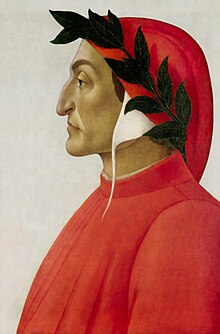
Back Данте Алигьери Abkhazian Dante Alighieri Afrikaans Dante Alighieri ALS ዳንቴ አሊጊዬሪ Amharic Dante Alighieri AN दान्ते ऐलिगिरी ANP دانتي أليغييري Arabic دانتى اليجييرى ARZ ডাণ্টে এলিগিয়েৰি Assamese Dante Alighieri AST
Dante Alighieri | |
|---|---|
 | |
| Born | Durante di Alighiero degli Alighieri[a] c. May 1265[1] Florence, Republic of Florence |
| Died | September 14, 1321 (aged c. 56) Ravenna, Papal States |
| Resting place | Tomb of Dante, Ravenna |
| Occupation |
|
| Language | |
| Nationality | Florentine |
| Period | Late Middle Ages |
| Literary movement | Dolce Stil Novo |
| Notable works | Divine Comedy |
| Spouse | Gemma Donati |
| Children | 4, including Jacopo |
| Parents |
|
Dante Alighieri (Italian: [ˈdante aliˈɡjɛːri]; most likely baptized Durante di Alighiero degli Alighieri;[a] c. May 1265 – September 14, 1321), widely known mononymously as Dante,[b] was an Italian[c] poet, writer, and philosopher.[6] His Divine Comedy, originally called Comedìa (modern Italian: Commedia) and later christened Divina by Giovanni Boccaccio,[7] is widely considered one of the most important poems of the Middle Ages and the greatest literary work in the Italian language.[8][9]
Dante is known for establishing the use of the vernacular in literature at a time when most poetry was written in Latin, which was accessible only to educated readers. His De vulgari eloquentia (On Eloquence in the Vernacular) was one of the first scholarly defenses of the vernacular. His use of the Florentine dialect for works such as The New Life (1295) and Divine Comedy helped establish the modern-day standardized Italian language. His work set a precedent that important Italian writers such as Petrarch and Boccaccio would later follow.
Dante was instrumental in establishing the literature of Italy, and is considered to be among the country's national poets and the Western world's greatest literary icons.[10] His depictions of Hell, Purgatory, and Heaven provided inspiration for the larger body of Western art and literature.[11][12] He influenced English writers such as Geoffrey Chaucer, John Milton, and Alfred Tennyson, among many others. In addition, the first use of the interlocking three-line rhyme scheme, or the terza rima, is attributed to him. He is described as the "father" of the Italian language,[13] and in Italy he is often referred to as il Sommo Poeta ("the Supreme Poet").[14] Dante, Petrarch, and Boccaccio are also called the tre corone ("three crowns") of Italian literature.
Cite error: There are <ref group=lower-alpha> tags or {{efn}} templates on this page, but the references will not show without a {{reflist|group=lower-alpha}} template or {{notelist}} template (see the help page).
- ^ His birth date is listed as "probably in the end of May" by Robert Hollander in "Dante" in Dictionary of the Middle Ages, volume 4. According to Giovanni Boccaccio, the poet said he was born in May. See "Alighieri, Dante" in the Dizionario Biografico degli Italiani.
- ^ Gorni, Guglielmo (2009). "Nascita e anagrafe di Dante". Dante: storia di un visionario. Rome: Gius. Laterza & Figli. ISBN 9788858101742.
- ^ "Dante". Collins English Dictionary. HarperCollins. Archived from the original on September 9, 2019. Retrieved May 20, 2019.
- ^ "Dante"[dead link] (US) and "Dante". Lexico UK English Dictionary. Oxford University Press. Archived from the original on March 22, 2020.
- ^ Pliny the Elder, Letters 9.23.
- ^ Wetherbee, Winthrop; Aleksander, Jason (April 30, 2018). Zalta, Edward N. (ed.). The Stanford Encyclopedia of Philosophy. Metaphysics Research Lab, Stanford University – via Stanford Encyclopedia of Philosophy.
- ^ Hutton, Edward (1910). Giovanni Boccaccio, a Biographical Study Archived February 4, 2021, at the Wayback Machine. p. 273.
- ^ Bloom, Harold (1994). The Western Canon. Riverhead Books. ISBN 9781573225144.
- ^ Shaw 2014, p. xiii.
- ^ Matheson, Lister M. (2012). Icons of the Middle Ages: Rulers, Writers, Rebels, and Saints. Greenwood Pub Group. p. 244.
- ^ Haller, Elizabeth K. (2012). "Dante Alighieri". In Matheson, Lister M. (ed.). Icons of the Middle Ages: Rulers, Writers, Rebels, and Saints. Vol. 1. Santa Barbara, CA: Greenwood. p. 244. ISBN 978-0-313-34080-2.
- ^ Murray, Charles A. (2003). Human accomplishment: the pursuit of excellence in the arts and sciences, 800 B.C. to 1950 (1st ed.). New York: HarperCollins. ISBN 978-0-06-019247-1. OCLC 52047270.
- ^ Barański, Zygmunt G.; Gilson, Simon, eds. (2018). The Cambridge Companion to Dante's 'Commedia'. Cambridge University Press. p. 108. ISBN 9781108421294.
- ^ "Alla 'Casa di Dante' a Roma si celebra il Sommo Poeta" (in Italian).